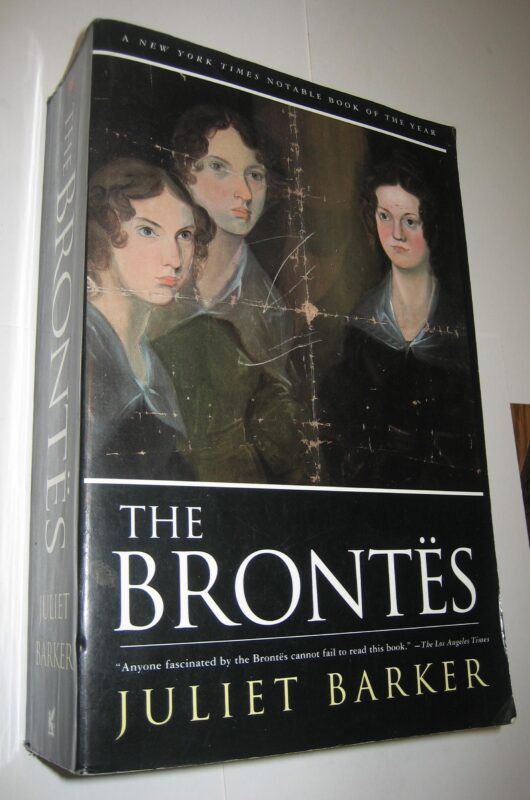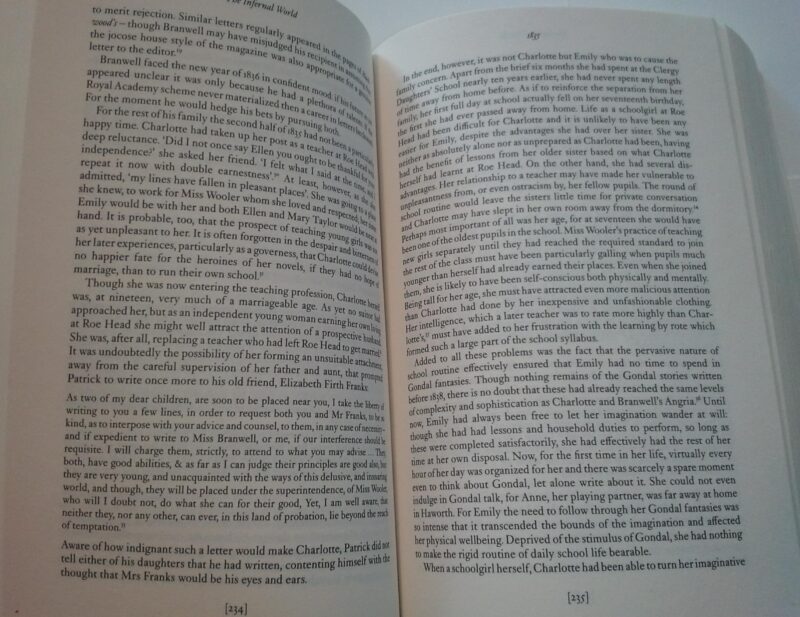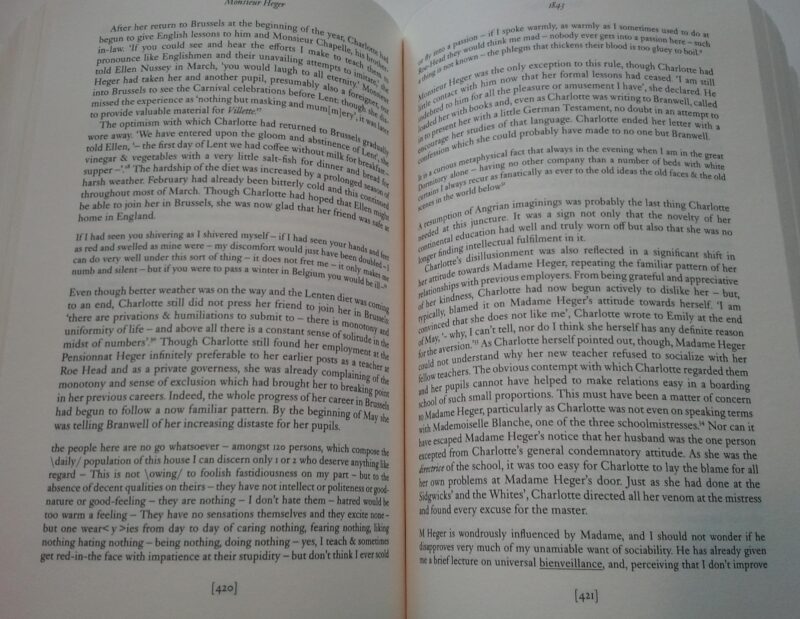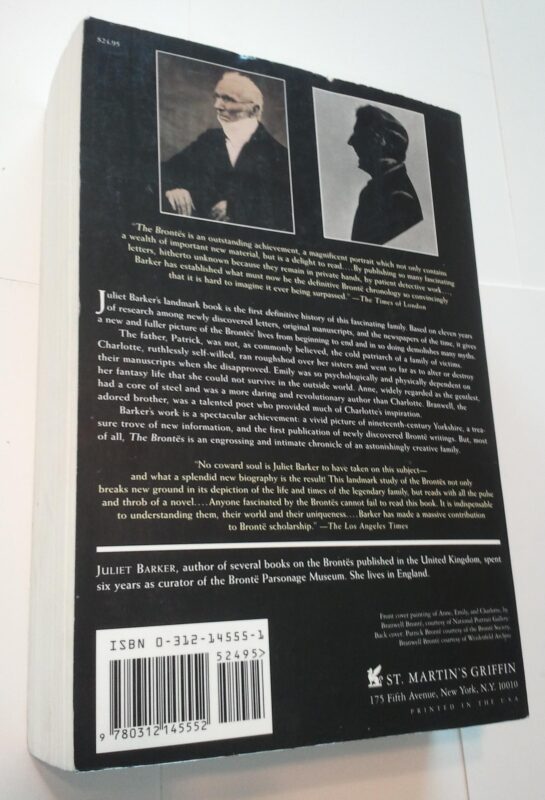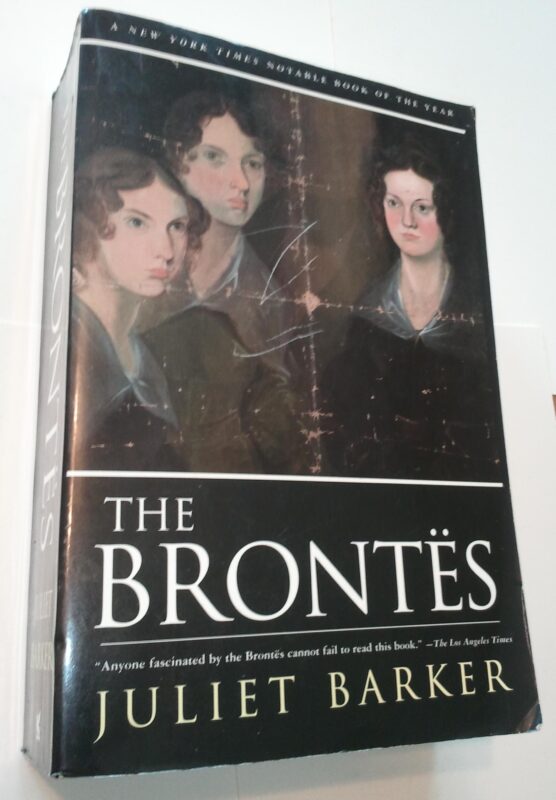Description
The Brontes Paperback
by Juliet Barker (Author)
The story of the tragic Brontë family is familiar: we all know about the half-mad, austere and repressive father, the drunken wastrel of a brother, wild, romantic Enily, unrequited Anne and Charlotte, the sole survivor, virtually imprisoned by her father’s demands. Or do we?
Juliet Barker’s landmark book is the first definitive history of the Brontës – and it demolishes many myths. Based on eleven years of research among newly-discovered letters by every member of the family, original manuscripts and the newspapers of the time, it gives a radically new picture of the Brontës’ lives from beginning to end.
Haworth was not a village at the edge of civilization, populated by coarse and drunken savages: it had a thriving cultural life of libraries, musical societies and lectures. Its hardworking and concerned parson, Patrick Brontë, was a loving father who took part in his children’s game, and a tireless campaigner for liberal reforms. His was by no means a family of victims. Charlotte, ruthlessly self-willed, did not scruple to use her father as an excuse, to run roughshod over her sisters’ wishes, nor indeed to alter or destroy their manuscripts when she disapproved of them. Emily, self-absorbed and unyielding, was so psychologically and physically dependent on her fantasy life that she could not survive in the outside world – and did not have to. Gentle Anne had a core of steel: as a writer she was more daring and more revolutionary than Charlotte. Branwell, the much-loved brother, was a talented poet whose innovative childhood writings were the source of much of Charlotte’s inspiration.
Juliet Barker’s The Brontës is a spectacular achievement: a vivid picture of nineteenth-century Yorkshire, a treasure trove of new information, including newly-discovered poems and letters by Patrick, Branwell, Emily and Anne, published for the first time in this book – and, most of all, an engrossing and intimate chronicle of an astonishingly creative family, which will remain the definitive biography for many years to come.
‘This landmark study of the Brontës not only breaks new ground in its depiction of the life and times of the legendary family, but reads with all the pulse and throb of a novel … Anyone fascinated by the Brontës cannot fail to read this book. It is indispensable to understanding them, their world, their uniqueness … Barker has made a massive contribution to Brontë scholarship’ The Los Angeles
Times.xxxxxxxxxxx
Juliet says: “If anyone had asked me what was my ambition when I was a teenager I would have said that it was to write a biography of the Brontës. I had been immersed in the Brontës since childhood, and, living near Haworth, loved the landscapes that had inspired them as much as their novels. I always thought it would be impossible to realise my dream: so many books had already been written – how could there be room for one more?
It wasn’t until the 1980s, when I was working at the Brontë Parsonage Museum as the librarian and curator, that I realised just how much unpublished manuscript material there was available, particularly for the hitherto vilified men in the Brontës’ lives – their father Patrick, brother Branwell and Charlotte’s husband Arthur Bell Nicholls. I also realised that the published editions of letters, juvenilia and poetry upon which most previous biographers had relied were incomplete and unreliable. When I left the museum in 1989 I therefore made it my mission to track down as many of the manuscripts as possible and transcribe them as accurately as I could. This was especially difficult in the case of the juvenilia, not just because of the minute size of the handwriting but because the manuscripts had been divided up and sold off page by page to different collectors. Reconstructing them was like doing an immense jigsaw puzzle but the reward was to see Branwell emerge as the leader and originator of the Brontës’ childhood stories: where he led his sisters followed and without him there would have been no Jane Eyre, Wuthering Heights or Tenant of Wildfell Hall.
As a historian it was also clear to me that previous biographers had also neglected to make full use of the historical records available. The most valuable source turned out to be local newspapers, which revealed not only many original Brontë contributions but also a wealth of information which radically changed the received view of what Haworth was like at the time. Mrs Gaskell’s description of a remote village cut off from civilisation and caught in an eighteenth century time-warp turned out to be completely wrong: Haworth was a busy industrial township with dozens of working mills, a thirst for self-improvement (fostered by an enlightened and self-educated Reverend Patrick Brontë) and a thriving arts culture, particularly in the field of music.
Rather to my own surprise, therefore, I discovered not only that was there room for a new biography of the Brontës but that it was an absolute necessity to set the record straight. Time to put Mrs Gaskell’s Life of Charlotte Brontë back on the fiction shelves where it belongs!”
Regardless of one’s opinions about Juliet Barker’s impression of Charlotte, and the rest of the Brontes, one can argue neither with the credibility of the author nor with her incredible research. The author has lived within a few miles of Haworth her entire life; was librarian and curator at the Bronte Parsonage Museum for six years; and researched this book for 11 years before publishing. The biography is 830 pages long, with an additional 150 pages of notes, and 30 pages of index. I would recommend this to those who are already well acquainted with the Brontes. It won’t change your own personal myth of the Brontes, but it will shed light on trivia that might help explain background, names, and places in the various Bronte novels. For example, Charlotte’s pseudonym, Currer Bell, now makes sense, though I disagree with Juliet’s suggestion. This is much more than a biography; Juliet Barker includes the politics of the time, origins of modern Christian religious offshoots, the labor movement (the Luddites), and even the architecture (for example, the Late Perpendicular movement). Barker’s description of the English landscape is wonderful, if a bit stilted. (When one is as emotionally linked with Yorkshire as I am, it’s hard not be judgmental on descriptions of that wonderful place.) This book was meant to be read by the fire, on a cold and dark winter night, preferably in Haworth, with a soul mate who appreciates Yorkshire and all it has to offer.
Writing on 1st page. Page rounding to the first few pages. 1st printing. 0-312-14555-1.
Fever 105 is hosted by Oliver “Ladykiller” Biscuit (voiced by Julius Dyson) and plays disco, soul and R&B. Fever 105 is one of two preferred radio stations tuned in by the Haitian gang, which can be heard after the player carjacks their gang vehicles. The station is also the default radio station set when the player enters Lance Vance’s white Infernus sports car.
Grand Theft Auto Vice City O.S.T – Volume 6: Fever 105
“D.J. Oliver “Ladykiller” Biscuit Introduction” – Various Artists
“Wanna Be Startin’ Somethin'” – Michael Jackson – 6:02
“Automatic” – The Pointer Sisters – 6:05
“Act Like You Know” – Fat Larry’s Band – 5:23
“Juicy Fruit” – Mtume – 6:00
“Behind the Groove” – Teena Marie – 6:06
“D.J. Oliver “Ladykiller” Biscuit Halftime” – Various Artists
“Get Down Saturday Night” – Oliver Cheatham – 7:32
“Ghetto Life” – Rick James – 4:20
“Shame” – Evelyn “Champagne” King – 6:34
“All Night Long” – Mary Jane Girls – 5:34
“Summer Madness” – Kool & the Gang – 4:16
“I’ll Be Good” – René & Angela – 5:14
“Last Night a D.J. Saved My Life” – Indeep – 5:40
“And the Beat Goes On” – The Whispers – 7:30
“D.J. Oliver “Ladykiller” Biscuit Outro” – Various Artists
“Salivex” – Various Artists
“Yuppie and the Alien” – Various Artists
CD shows some use.CD shows some use.
Related products
-
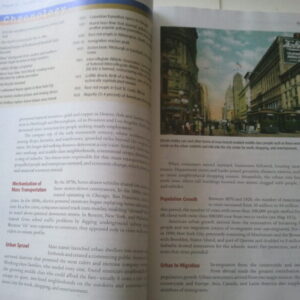
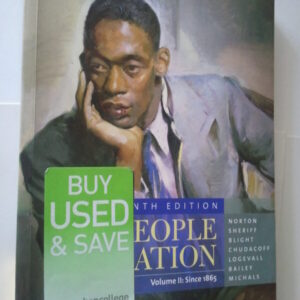
A People & A Nation Vol 2: Since 1865 Brief 9th Edition SC Norton Sheriff Blight Chudacoff
$69.99 Add to cart -
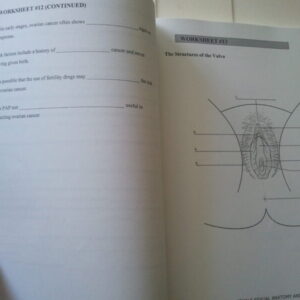
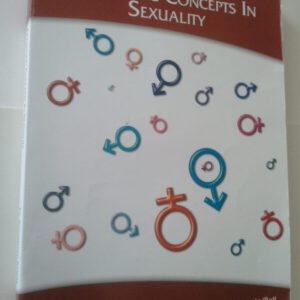
Examining Concepts in Sexuality Workbook SC Rosemary Iconis
$49.99 Add to cart -
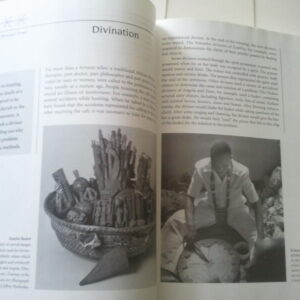
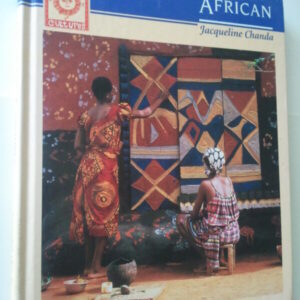
African Arts & Cultures HC Jacqueline Chanda Davis Publications 1993
$74.99 Add to cart -
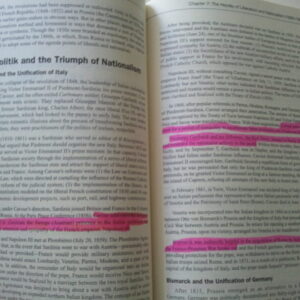

AP European History Testware Edition 10th Edition SC REA
$49.99 Add to cart
